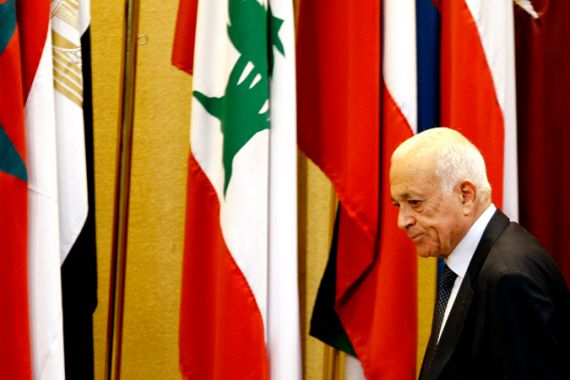Arab states seek end to Syria crisis
Arab League’s secretary-general to head to Damascus in bid to mediate an end to months-long crackdown.

Arab League chief Nabil el-Arabi will head to Damascus bearing “an initiative to solve the crisis” in Syria, a statement said after a special meeting of Arab foreign ministers.
The ministers “asked the secretary-general of the Arab League to carry out an urgent mission to Damascus and transmit the Arab initiative to resolve the crisis to the Syrian leadership,” the statement said early on Sunday.
It did not give details of the initiative, but Al Jazeera has learned that some of the suggestions would include the holding of presidential elections, withdrawal of the army from the cities, the release of political prisoners and those rounded up in the protests, and the formation of a national unity government that includes members from the opposition.
The statement also called for an end to the bloodshed in Syria that opposition activists say has left more than 2,200 people dead and urged respect for the Syrian people’s right to see political, social and economic reforms.
The ministers expressed their “concern faced with the grave developments on the Syrian scene” and called in their statement for an “end to the spilling of blood and follow the way of reason before it is too late.”
The Arab League also said Syria’s stability was crucial to the stability of the Arab world and the whole region.
Inside the meeting hall, television screens showed footage of dead victims of the crackdown in the Syrian cities of Hama and Deir ez-Zor.
It was not clear when el-Arabi would visit Syria but sources told Al Jazeera that it was expected to happen as early as Sunday.
Russia also announced it was sending a senior envoy to Damascus on Monday, according to the Itar-Tass news agency.
‘Too little, too late’
Meanwhile, Turkish President Abdullah Gul said his country had “lost confidence” in the Syrian leadership.
“We are really very sad,” he told Anatolian news agency. “Incidents are said to be ‘finished’ and then another 17 people are dead. How many will it be today? Clearly we have reached a point where anything would be too little too late. We have lost our confidence.”
In the latest bloodletting, the Syrian Observatory for Human Rights and the Local Co-ordination Committees reported that one man had been shot overnight in the Damascus suburb of Saqba.
Residents also reported gun battles between Assad supporters and army defectors in the Qadam suburb.
The clashes reportedly started after four to five soldiers joined protests.
On Saturday, activists said one demonstrator was killed and 10 hurt when security forces attacked the Rifai mosque in the capital’s western suburb of Kafarsouseh.
Activists said security forces stormed the mosque, attacking Osama al-Rifai, the 80-year-old imam, and arrested about 150 people.
Later in the day, protesters from Douma, on the outskirts of Damascus, marched towards the centre of the city to protest against the mosque attack. When the protesters arrived in the suburb of Saqba, security forces opened fire on them and one person was killed, according to activists.
New media law
On Sunday, President Assad issued a decree for a new media law, according to the state-run news agency SANA reports.
The law partly liberalises repressive legislation under which journalists faced jail for, among other things, attacking “the prestige and dignity of the state, national unity and the morale of the army.”
“There is an important article in the new law that bans the imprisonment of journalists. The law gives more freedom to have access to information, and officials will be obligated to provide information,” Elias Murad, head of the journalists’ union, told AFP.
Murad said the law did not put restrictions on journalists, “excluding issues related to the nation, enemy and national unity, which is natural.”
“It authorises citizens to open a newspaper or television station and obliges government officials and public institutions to provide information so journalists can ply their trade, while taking national imperatives into account,” Murad said.
However journalists can still face fines of up to $21,000 for defamation.